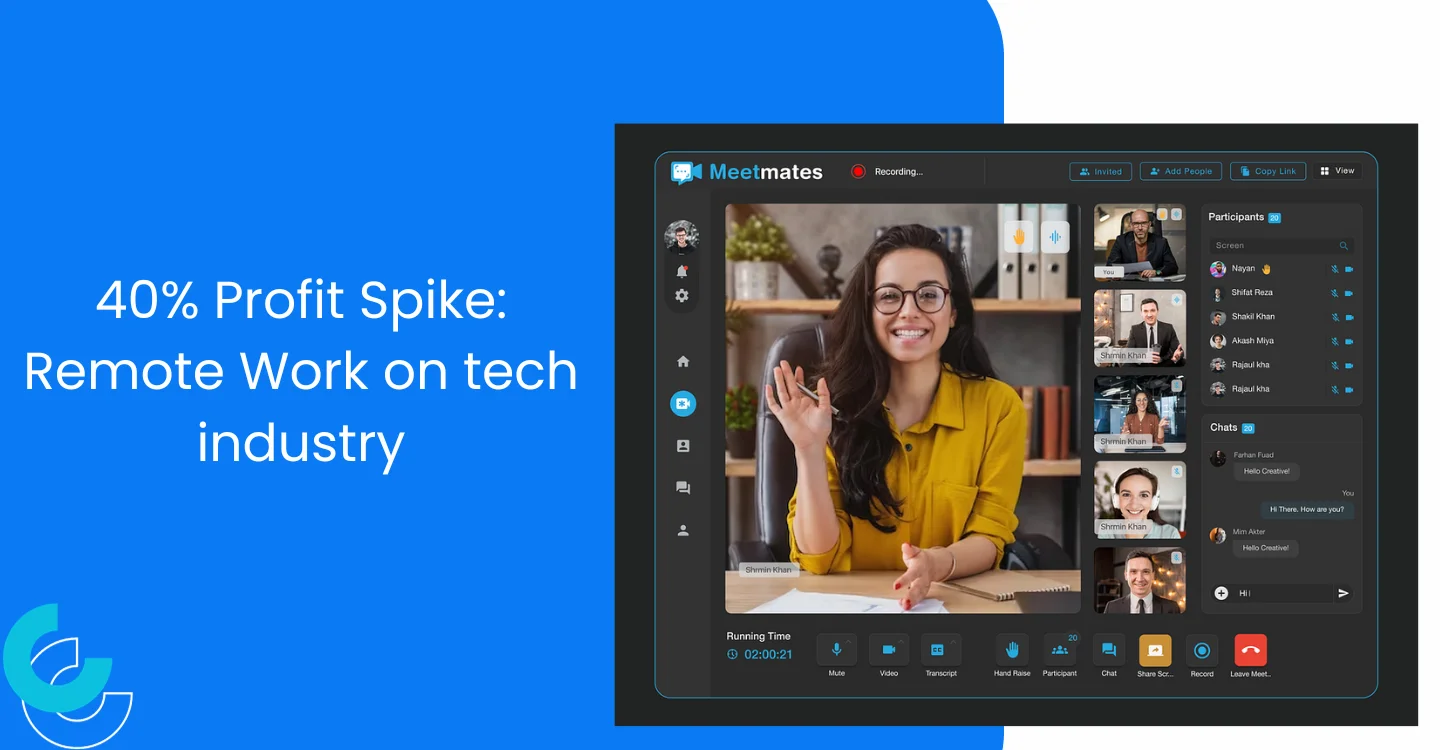The Rise of Remote Work in the Tech Sector
The tech sector has undergone a substantial transformation due to the surge in remote work, propelled by technological advancements and shifting dynamics. Remote work has emerged as the prevailing trend in the industry.
Numerous factors support remote work, including high-speed internet connections, cloud computing, and collaborative tools that empower individuals to connect even when physically distant. These components foster an environment where employees are encouraged to work from any location.
The industry’s emerging trend has proven to be cost-effective and offers numerous advantages. This work model transcends geographical barriers, allowing employees the flexibility to work from any location that suits them. Furthermore, companies have the opportunity to select the best candidate from a vast pool of talent. Thus, this method prioritizes skills and talents over physical location
By embracing a remote culture, reducing additional expenses, and tapping into global talent, a tech company can double its productivity.
Tech companies are capitalizing on the advantages of remote work, witnessing a twofold increase in productivity, reduced overhead costs, and the opportunity to access global expertise. Developers, designers, and engineers can propel innovation forward at an accelerated pace. As the trend of remote work continues to grow, it becomes increasingly clear that its impact on the tech sector is not only transformative but also enduring.
Global Opportunities Through Remote Work
Remote work has unlocked a myriad of opportunities globally, enabling companies to select the best candidate without being restricted by location. Diverse talents converge, bringing unique perspectives and enhancing the work environment. Moreover, it significantly reduces additional costs and offers greater flexibility in work arrangements.
Explore the Cost Savings Related to Remote Work
Remote work offers numerous cost-saving advantages for both employees and employers. Below are some potential cost-saving benefits associated with working remotely:
- Office Space: Companies can reduce costs on rent, maintenance, and other utilities..
- Utilities and Overheads: Utility expenses, including electricity bills, cooling, water, and other costs, can be minimized.
- Real Estate Costs: By avoiding the costs associated with leasing and renting office space in upscale locations, you can efficiently minimize expenses, as these spaces typically incur higher charges.
- Furniture and Equipment: In a remote work setting, employees can make use of their personal resources, including furniture, electricity, internet connection, and computers, thereby diminishing the need for companies to offer maintenance support.
- Commute Costs: The commute cost for employees is significantly reduced, encompassing savings on gas, transportation fares, parking fees, and more.
- Travel and Accommodation: As virtual alternatives become increasingly prevalent, companies can curtail travel-related expenses associated with meetings, conferences, and training sessions.
- Meals and Snacks: Employees who work from home can accumulate significant savings by avoiding expenses on office meals, thereby contributing to potential cost savings.
- Dress Code and Grooming:
- When working from home, employees are relieved from the necessity of allocating a substantial portion of their funds to grooming and office attire.
- Sick Leave and Health Costs: Remote employees can save money on sick leave pay and health insurance costs by working from home.
- Environmental Impact: Reduced travel leads to fewer cars on the road, yielding environmental benefits and enhanced air quality.
Why Recruit Talent Remotely?
- Limited Talent Pool:
Restricting talent acquisition to a limited locality may result in a constrained pool of skills, and occasionally, the hired talent may not align with your specific requirements, necessitating additional expenditures on upskilling. - The Gap Between Demand And Supply:
The demand for highly skilled talent is increasing daily. Korn Ferry anticipates a talent crunch of 85 million professionals by 2030, underscoring the widening gap between the demand for talent and its supply. - Expense and Time Constraints: The hiring process becomes extended when the right talent is not found, resulting in increased loss of both time and money. Furthermore, leaving a position vacant for an extended period adversely affects the operations of the business.
So, how do we recruit top talent and overcome these obstacles? There is only one solution – Outsourcing.
Cost-Efficiency and Profitability with Remote Hiring
- Reduced operational costs
Businesses, especially startups, can reduce costs by opting for remote employees. When hiring remotely, employees utilize their personal resources such as WIFI, laptops, electricity, and other utilities.
Engaging skilled talents globally provides distinct advantages for organizations aiming to elevate their business. By expanding the hiring process beyond geographical constraints, companies can swiftly onboard employees, offering competitive salaries and benefits in local currencies. - Impact on Profit Margins and Business Growth
Remote hiring has introduced a novel approach to cost savings and bolstering business profitability. The primary impact is observed in the business’s profit margin, achieved by reducing operational expenses such as office space, commuting allowances, and office maintenance. This enables the company to strategically allocate resources. Accessing global talent pools at competitive rates allows businesses to optimize compensation, attracting top-notch professionals. Consequently, they can channel investments into marketing campaigns, research and development initiatives, or the expansion of products and services.
Start Recruiting Remotely With NextUpgrad
Several companies, such as GitLab, Shopify, and Dell, actively recruit remote talent to build teams comprising individuals with diverse skills. If you aim to strengthen your employer’s team and hire top-notch talent, consider embracing remote hiring.
Collaborate with NextUpgrad to fully harness the potential of remote talent and seamlessly expand your workforce. Beyond facilitating search and onboarding processes, we also provide unparalleled support for an optimal talent management experience.
We recommend the finest talent for your project; however, it is not mandatory to choose from our suggestions. Feel free to select the talent of your choice from our vast pool of skilled professionals.
Contact us now to fulfill your hiring requirements quickly and cost-effectively.




